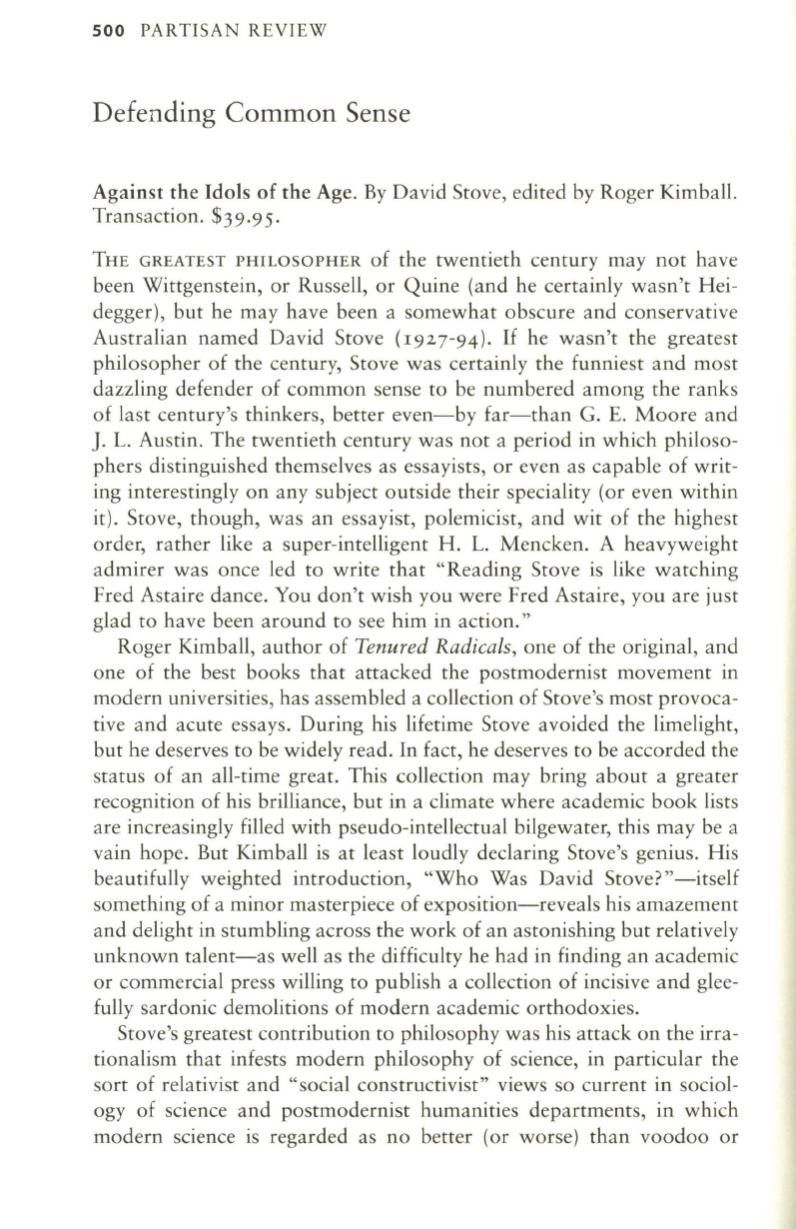
500
PARTISAN REVIEW
Defending Common Sense
Against the Idols of the Age. By David Stove, edited by Roger Kimball.
Transaction. $39 .95.
THE GREATEST PHILOSOPHER
of the twentieth century may not have
been Wittgenstein, or Russell, or Quine (and he certainly wasn't Hei–
degger), but he may have been a somewhat obscure and conservative
Australian named David Stove (I927-94).
If
he wasn't the greatest
philosopher of the century, Stove was certainly the funniest and most
dazzling defender of common sense to be numbered among the ranks
of last century's thinkers, better even-by far-than G. E. Moore and
J.
L.
Austin. The twentieth century was not a period in which philoso–
phers distinguished themselves as essayists, or even as capable of writ–
ing interestingly on any subject outside their speciality (or even within
it). Stove, though, was an essayist, polemicist, and wit of the highest
order, rather like a super-intelligent H.
L.
Mencken. A heavyweight
admirer was once led to write that "Reading Stove is like watching
Fred Astaire dance. You don 't wish you were Fred Astaire, you are just
glad to have been around to see him in action."
Roger Kimball, author of
Tenured Radicals,
one of the original, and
one of the best books that attacked the postmodernist movement in
modern universities, has assembled a collection of Stove's most provoca–
tive and acute essays. During his lifetime Stove avoided the limelight,
but he deserves to be widely read. In fact, he deserves to be accorded the
status of an all-time great. This collection may bring about a greater
recognition of his brilliance, but in a climate where academic book lists
are increasingly filled with pseudo-intellectual bilgewater, this may be a
vain hope. But Kimball is at least loudly declaring Stove's genius. His
beautifully weighted introduction, "Who Was David Stove?"-itself
something of a minor masterpiece of exposition-reveals his amazement
and delight in stumbling across the work of an astonishing but relatively
unknown talent-as well as the difficulty he had in finding an academic
or commercial press willing to publish a collection of incisive and glee–
fully sardonic demolitions of modern academic orthodoxies.
Stove's greatest contribution to philosophy was his attack on the irra–
tionalism that infests modern philosophy of science, in particular the
sort of relativist and "social constructivist" views so current in sociol–
ogy of science and postmodernist humanities departments, in which
modern science is regarded as no better (or worse) than voodoo or


